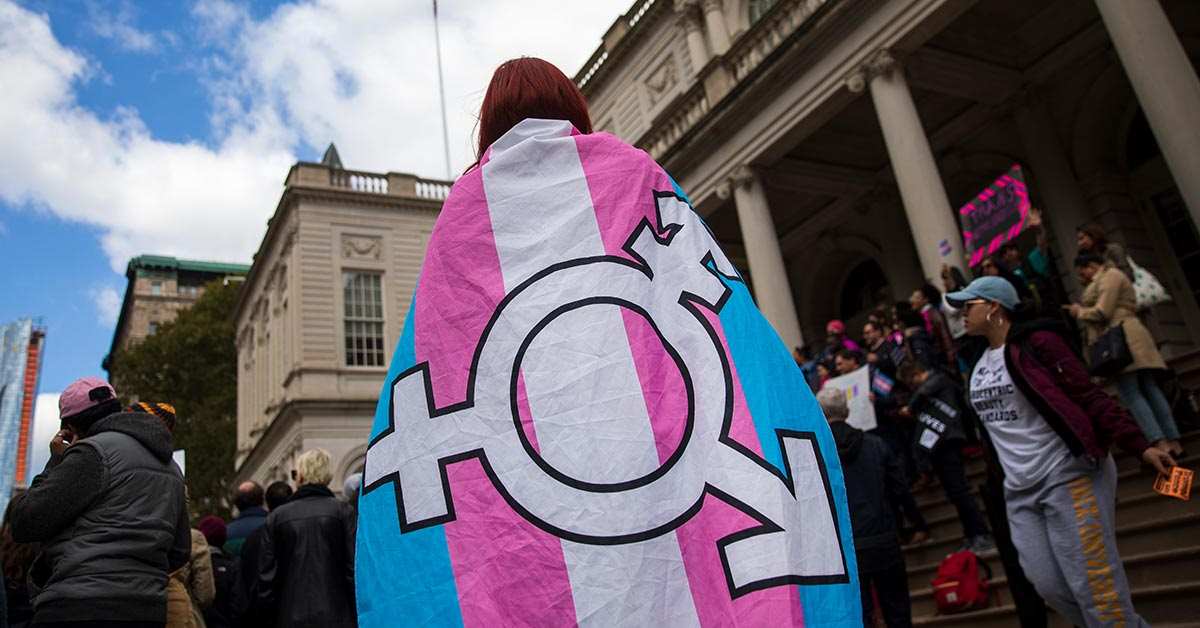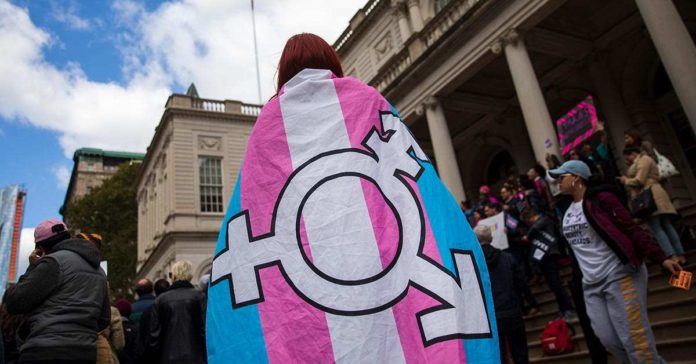
WASHINGTON, D.C. — While Americans maintain their support for transgender military service, a majority believe birth gender, rather than gender identity, should govern participation in competitive sports.
A solid majority of the public (66%) continues to favor allowing openly transgender men and women to serve in the U.S. military, though this figure is down slightly from Gallup’s previous measure in 2019, when 71% were in favor.
U.S. Support for Transgender People Serving in the Military, 2019 vs. 2021
Do you favor or oppose allowing openly transgender men and women to serve in the military? (% Favor)
| 2019 | 2021 | Change | |||||||||||||||||||||||||||||||||||||||||||||||||||||||||||||||||||||||||||||||||||||||||||||||||
|---|---|---|---|---|---|---|---|---|---|---|---|---|---|---|---|---|---|---|---|---|---|---|---|---|---|---|---|---|---|---|---|---|---|---|---|---|---|---|---|---|---|---|---|---|---|---|---|---|---|---|---|---|---|---|---|---|---|---|---|---|---|---|---|---|---|---|---|---|---|---|---|---|---|---|---|---|---|---|---|---|---|---|---|---|---|---|---|---|---|---|---|---|---|---|---|---|---|---|---|
| % | % | pct. pts. | |||||||||||||||||||||||||||||||||||||||||||||||||||||||||||||||||||||||||||||||||||||||||||||||||
| U.S. adults | 71 | 66 | -5 | ||||||||||||||||||||||||||||||||||||||||||||||||||||||||||||||||||||||||||||||||||||||||||||||||
| Republicans | 43 | 43 | 0 | ||||||||||||||||||||||||||||||||||||||||||||||||||||||||||||||||||||||||||||||||||||||||||||||||
| Independents | 78 | 66 | -12 | ||||||||||||||||||||||||||||||||||||||||||||||||||||||||||||||||||||||||||||||||||||||||||||||||
| Democrats | 88 | 87 | -1 | ||||||||||||||||||||||||||||||||||||||||||||||||||||||||||||||||||||||||||||||||||||||||||||||||
| Men | 64 | 57 | -7 | ||||||||||||||||||||||||||||||||||||||||||||||||||||||||||||||||||||||||||||||||||||||||||||||||
| Women | 79 | 74 | -5 | ||||||||||||||||||||||||||||||||||||||||||||||||||||||||||||||||||||||||||||||||||||||||||||||||
| 18-29 | 84 | 76 | -8 | ||||||||||||||||||||||||||||||||||||||||||||||||||||||||||||||||||||||||||||||||||||||||||||||||
| 30-49 | 73 | 68 | -5 | ||||||||||||||||||||||||||||||||||||||||||||||||||||||||||||||||||||||||||||||||||||||||||||||||
| 50-64 | 66 | 63 | -3 | ||||||||||||||||||||||||||||||||||||||||||||||||||||||||||||||||||||||||||||||||||||||||||||||||
| 65+ | 66 | 57 | -9 | ||||||||||||||||||||||||||||||||||||||||||||||||||||||||||||||||||||||||||||||||||||||||||||||||
| Gallup | |||||||||||||||||||||||||||||||||||||||||||||||||||||||||||||||||||||||||||||||||||||||||||||||||||
These data — from Gallup’s annual Values and Beliefs survey, conducted May 3-18 — come weeks after the Pentagon reversed a Trump-era policy that banned openly transgender people from serving.
Democrats (87%) remain about twice as likely as Republicans (43%) to favor allowing openly transgender service members in the military; both groups are essentially unchanged from the 2019 poll. Political independents, meanwhile, have become less supportive than they were in 2019 — down 12 percentage points. Still, two in three self-identifying independents favor allowing openly trans people to serve.
Gallup has routinely found shifts in public opinion, particularly among political independents, during presidential transition periods — as has been the case for approval of the Affordable Care Act and support for labor unions.
Support for transgender Americans’ right to serve in the military is down at least slightly among all age and gender groups, though all groups maintain majority levels of support. Adults younger than 50 remain more in favor than adults aged 50 and older, and women remain more in favor than men.
Self-identified liberals (92%) are most supportive of transgender people’s right to serve in the military, while 73% of moderates and 42% of conservatives agree.
The current level of support for transgender military service is similar to past support for gay and lesbian military service, which ranged between 63% and 70% in 2004-2010 Gallup polls, prior to the repeal of the “don’t ask, don’t tell” policy.
Most Say Trans Athletes Should Play on Teams That Match Birth Gender
At the same time a solid majority of Americans endorse transgender military service, they favor restrictions on transgender athletes’ ability to play on teams that correspond with their gender identity. The issue is being debated in dozens of state legislatures, and five U.S. states have banned transgender girls, who were born male, from playing on girls’ sports teams.
A majority of Americans (62%) say trans athletes should only be allowed to play on sports teams that correspond with their birth gender, while 34% say they should be able to play on teams that match their gender identity.
Among party, gender and age subgroups, only Democrats (55%) express majority support for transgender athletes’ ability to play on teams matching their gender identity.
U.S. Views on Transgender Athlete Policies in Sports
Next, we have a question about policies for competitive sports that have separate teams for male and female athletes. Do you think transgender athletes — [ROTATED: should be able to play on sports teams that match their current gender identity (or) should only be allowed to play on sports teams that match their birth gender]?
| Play on teams that match gender identity | Play on teams that match birth gender | No opinion | |||||||||||||||||||||||||||||||||||||||||||||||||||||||||||||||||||||||||||||||||||||||||||||||||
|---|---|---|---|---|---|---|---|---|---|---|---|---|---|---|---|---|---|---|---|---|---|---|---|---|---|---|---|---|---|---|---|---|---|---|---|---|---|---|---|---|---|---|---|---|---|---|---|---|---|---|---|---|---|---|---|---|---|---|---|---|---|---|---|---|---|---|---|---|---|---|---|---|---|---|---|---|---|---|---|---|---|---|---|---|---|---|---|---|---|---|---|---|---|---|---|---|---|---|---|
| % | % | % | |||||||||||||||||||||||||||||||||||||||||||||||||||||||||||||||||||||||||||||||||||||||||||||||||
| U.S. adults | 34 | 62 | 4 | ||||||||||||||||||||||||||||||||||||||||||||||||||||||||||||||||||||||||||||||||||||||||||||||||
| Republicans | 10 | 86 | 5 | ||||||||||||||||||||||||||||||||||||||||||||||||||||||||||||||||||||||||||||||||||||||||||||||||
| Independents | 33 | 63 | 4 | ||||||||||||||||||||||||||||||||||||||||||||||||||||||||||||||||||||||||||||||||||||||||||||||||
| Democrats | 55 | 41 | 4 | ||||||||||||||||||||||||||||||||||||||||||||||||||||||||||||||||||||||||||||||||||||||||||||||||
| Men | 24 | 72 | 4 | ||||||||||||||||||||||||||||||||||||||||||||||||||||||||||||||||||||||||||||||||||||||||||||||||
| Women | 43 | 53 | 4 | ||||||||||||||||||||||||||||||||||||||||||||||||||||||||||||||||||||||||||||||||||||||||||||||||
| 18-29 | 35 | 59 | 6 | ||||||||||||||||||||||||||||||||||||||||||||||||||||||||||||||||||||||||||||||||||||||||||||||||
| 30-49 | 34 | 64 | 1 | ||||||||||||||||||||||||||||||||||||||||||||||||||||||||||||||||||||||||||||||||||||||||||||||||
| 50-64 | 38 | 58 | 5 | ||||||||||||||||||||||||||||||||||||||||||||||||||||||||||||||||||||||||||||||||||||||||||||||||
| 65+ | 28 | 67 | 5 | ||||||||||||||||||||||||||||||||||||||||||||||||||||||||||||||||||||||||||||||||||||||||||||||||
| Gallup, May 3-18, 2021 | |||||||||||||||||||||||||||||||||||||||||||||||||||||||||||||||||||||||||||||||||||||||||||||||||||
Among political ideology groups, self-identified liberals (63%) are most supportive of allowing athletes to play on teams according to their gender identity, while 34% of moderates and 12% of conservatives have this view.
Half of Young Adults Personally Know Someone Who Is Transgender
About three in 10 Americans (31%) report having a friend, relative or colleague who is transgender.
Fully half of adults younger than 30 have a transgender person in their lives, but the rate falls with each older age cohort. Adults aged 65 and older (19%) are the least likely to know a transgender person.
Americans Who Say They Personally Know Someone Who Is Transgender
Do you have any friends or relatives or coworkers who have told you, personally, that they are transgender?
| Yes | No | ||||||||||||||||||||||||||||||||||||||||||||||||||||||||||||||||||||||||||||||||||||||||||||||||||
|---|---|---|---|---|---|---|---|---|---|---|---|---|---|---|---|---|---|---|---|---|---|---|---|---|---|---|---|---|---|---|---|---|---|---|---|---|---|---|---|---|---|---|---|---|---|---|---|---|---|---|---|---|---|---|---|---|---|---|---|---|---|---|---|---|---|---|---|---|---|---|---|---|---|---|---|---|---|---|---|---|---|---|---|---|---|---|---|---|---|---|---|---|---|---|---|---|---|---|---|
| % | % | ||||||||||||||||||||||||||||||||||||||||||||||||||||||||||||||||||||||||||||||||||||||||||||||||||
| U.S. adults | 31 | 69 | |||||||||||||||||||||||||||||||||||||||||||||||||||||||||||||||||||||||||||||||||||||||||||||||||
| 18-29 | 50 | 50 | |||||||||||||||||||||||||||||||||||||||||||||||||||||||||||||||||||||||||||||||||||||||||||||||||
| 30-49 | 31 | 68 | |||||||||||||||||||||||||||||||||||||||||||||||||||||||||||||||||||||||||||||||||||||||||||||||||
| 50-64 | 24 | 76 | |||||||||||||||||||||||||||||||||||||||||||||||||||||||||||||||||||||||||||||||||||||||||||||||||
| 65+ | 19 | 81 | |||||||||||||||||||||||||||||||||||||||||||||||||||||||||||||||||||||||||||||||||||||||||||||||||
| Gallup, May 3-18, 2021 | |||||||||||||||||||||||||||||||||||||||||||||||||||||||||||||||||||||||||||||||||||||||||||||||||||
Views on transgender athlete policies and right to serve openly in the military are slightly influenced by whether respondents personally know a transgender person. This is similar to what Gallup has found in the past about Americans who personally knew a gay person and their views on gay issues.
Those who know someone who is trans (40%) are more likely to say trans athletes should be able to play on a team of their gender identity than are people who do not know someone who is transgender (31%). Similarly, those who have a transgender person in their life (74%) are more supportive of transgender people’s right to openly serve in the military than are those who do not know someone who is trans (62%).
Bottom Line
More Americans are identifying as LGBT, with 0.6% of the U.S. population identifying as transgender, according to recent Gallup polling. Gallup has also recorded massive changes in how the public views gay and lesbian issues over the past several decades, while transgender issues are relatively new frontiers for society — and often ones that they are ambivalent on.
On one hand, strong majorities of Americans have supported transgender people’s right to openly serve in the military. Viewed alongside support for allowing openly gay and lesbian people to serve in the “don’t ask, don’t tell” era, it’s fair to say that most Americans believe that people who want to defend and fight for the U.S. should be allowed to, regardless of their identity.
On the other hand, the increasing rate of trans-identification among U.S. youth is challenging norms in ways that many Americans are not ready to question. Americans were split in separate polls taken in 2016 and 2017 on restroom policies for transgender people. With policies for interscholastic sports teams now gaining traction in state legislatures, the public leans against allowing these athletes to join teams of their gender identity. This opposition, juxtaposed against public support for transgender military service, suggests transgender sports participation may be seen as more of an issue of competitive fairness than of civil rights.
This political issue is fairly new to most Americans, though, and the public has changed its mind on LGBT issues in recent memory. So, while there is currently considerable resistance to letting athletes play on teams according to their gender identity rather than their birth gender, it’s possible that Americans may view the issue differently down the line. However, changes in views on LGBT issues are often driven by generational change, and at the moment, young Americans hold views similar to their elders’.
View complete question responses and trends (PDF download).
Learn more about how the Gallup Poll Social Series works.








